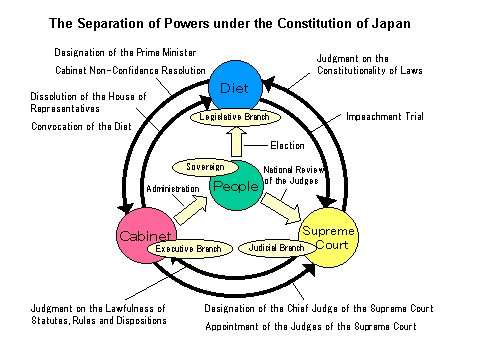(1) Overview
The current Constitution and the Cabinet Law went into effect on May 3, 1947, establishing the current framework of the Cabinet system. Namely, under the sovereignty of the people, the independence of the three branches of government - legislative, administrative and judicial powers - was emphasized, and the Cabinet was to be the main body to exercise administrative power within the basic framework of the Parliamentary Cabinet system.
The Prime Minister was given the status as "the head of the Cabinet" representing the Cabinet, and his/her status and power within the Cabinet were strengthened for consistency and unity of the Cabinet. However, with the exception of independent powers such as appointing and dismissing the Ministers of State and giving consent to impeachment of a Minister of State, the powers of the Prime Minister were exercised with the submission to the Cabinet meeting in principal.
In addition, the Constitution stipulates that executive or administrative power shall be vested in the Cabinet and in this sense all the responsibilities to execute administrative work belong to the Cabinet. However, all the administrative affairs are not handled by the Cabinet alone, but are practically distributed among the Cabinet Office and ten Ministries under the control of the Cabinet. Some of them further distribute their work through external organs such as committees and agencies.

|